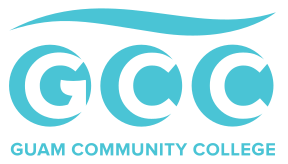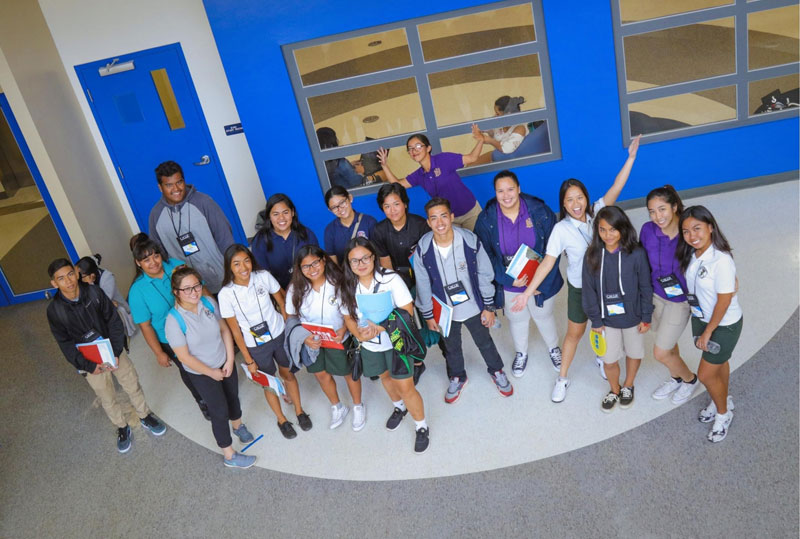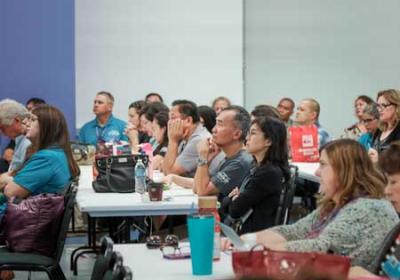Certificate in Automotive Service Technology
- You are on...
Main Page for Automotive Service Technology - General Service Technician
Certificate in Automotive Service Technology
Total Credit Hours: 31
The Certificate program in Automotive Service Technology General and Master Service Technician Tracks offers students comprehensive advanced technical training in automotive systems to include: Brakes, Electrical/Electronics, Engine Performance, Suspension & Steering, Automatic Transmissions and Trans-Axles, Engine Repair, Manual Drive Trains & Axles, Heating, Ventilation, and Air Conditioning (HVAC), and Advanced Engine Performance.
Upon completion students will be prepared for all content area certification examinations administered by the National Institute for Automotive Service Excellence (ASE).
General Service and Master Service Technician Tracks Program Student Learning Outcomes (SLOs):
Upon successful completion of the Certificate in Automotive Service Technology General Service Technician or Master Service Technician program, students will be able to:
- Identify the purpose and proper functioning of the core components of an automotive engine.
- Perform a cylinder compression cranking test and interpret results.
- Demonstrate the proper use of a digital multi-meter (DMM) during diagnosis of electrical circuit problems.
- Conduct a performance test of the heating, ventilation, and air conditioning system.
- Conduct failure analysis on automatic and manual transmissions and transaxles.
- Perform service and maintenance of components on the brake, steering, and suspension systems.
Hybrid Electric Vehicle Technician Track Program Student Learning Outcomes (SLOs):
Upon successful completion of the Certificate in Automotive Service Technology Hybrid Electric Vehicle Technician program, students will be able to:
- Perform high voltage disconnect procedure and reconnect/enable high voltage system.
- Describe the regenerative braking process.
- Diagnose problems caused by damaged or failed harnesses, connectors, and terminals.
- Explain the concept of an electric transaxle system.
General Service Technician Track | ||
Major Requirements | ||
Course | Course Name | Credits |
| AST100 | Introduction to Automotive Service | 3 |
| AST140 | Suspension and Steering | 6 |
| AST150 | Brakes | 6 |
| AST160 | Electrical/Electronic Systems | 5 |
| AST180 | Engine Performance | 8 |
| AST240 | Theory/Practicum: Suspension & Steering | 2 |
| AST250 | Theory/Practicum: Brakes | 2 |
| AST260 | Theory/Practicum: Electrical/Electronic Systems | 5 |
| AST280 | Theory/Practicum: Engine Performance | 8 |
Certificate Total | 45 | |
Master Service Technician Track (The Master Service Technician Certificate Track requires completion of all courses required for the General Service Technician Track, plus all of the following: | ||
Major Requirements | ||
Course | Course Name | Credits |
| AST110 | Engine Repair | 3 |
| AST120 | Automatic Transmission and Transaxle | 6 |
| AST130 | Manual Drive Train & Axles I | 6 |
| AST170 | Heating, Ventilation, and Air Conditioning (HVAC) | 6 |
| AST210 | Theory/Practicum: Engine Repair | 3 |
| AST220 | Theory/Practicum: Automatic Transmission and Transaxle | 3 |
| AST230 | Theory/Practicum: Manual Drive Train and Axles | 2 |
| AST270 | Theory/Practicum: Heating and Air Conditioning | 2 |
Certificate Total | 76 | |
Hybrid Electric Vehicle Technician Track | ||
Major Requirements | ||
Course | Course Name | Credits |
| AST100 | Introduction to Automotive Service | 3 |
| AST110 | Engine Repair | 3 |
| AST113 | Hybrid Engines and Motor/Generators | 4 |
| AST120 | Automatic Transmission and Trans-Axle | 6 |
| AST123 | Hybrid Electric Vehicle Energy Management, Transaxles, and Batteries | 4 |
| AST133 | Belted Alternator Starter (BAS), Power Electronics, and Support Systems | 4 |
| AST160 | Electrical / Electronic Systems | 5 |
| AST180 | Engine Performance | 8 |
| AST260 | Theory/Practicum: Electrical/Electronic Systems | 5 |
Certificate Total | 42 | |
| General Service Technician Track | ||
| Major Requirements | ||
| Course | Course Name | Credits |
| AST100 | Introduction to Automotive Service | 3 |
| AST140 | Suspension and Steering | 3 |
| AST150 | Brake Systems I | 3 |
| AST160 | Electrical/Electronic Systems | 3 |
| AST180A | Engine Performance I | 3 |
| AST180B | Engine Performance II | 3 |
| AST240 | Theory/Practicum: Suspension & Steering | 2 |
| AST250 | Theory/Practicum: Brakes | 2 |
| AST260 | Theory/Practicum: Engine Performance | 4 |
| AST280 | Theory/Practicum: Electrical/Electronic | 5 |
| Certificate Total | 31 | |
2024-2025 College Catalog
General Requirements for Certificates
Effective fall Semester 2003, several academic policy changes were implemented to ensure that students are adequately prepared to meet business and industry standards. All Undeclared or newly Declared Students enrolled in regularly scheduled postsecondary courses must be enrolled in or must have completed developmental coursework for Math and English or have successfully placed into post-secondary Math and English (or equivalent).
Students must fulfill the English general education requirement by the time they have enrolled in 12 credits of classes. This means that students may take only nine (9) credits before they must begin meeting the general education requirements. All declared students in Certificate programs will be required to successfully complete minimum general education course requirements. For more information, refer to the Admissions Information, General Education Policy section of this catalog.
A. General Education Requirements
Students must demonstrate proficiency in reading, writing, understanding and speaking English as indicated by one of the following:
- Test out of the English Placement Test (or equivalent), or
- Satisfactory completion of EN097 courses and
- Test out of the Math Placement Test (or equivalent), or
- Satisfactory completion of MA098 course
*Students in the Certificate of Construction Technology program can successfully complete their math requirements with MA094 Mathematics for the Trades in lieu of MA098 Intermediate Algebra.
B. Major Requirements. Total Major Requirements vary by program. Minimum Total Credits Required for a Certificate is 30 credits.
* No course may be counted for both Major and General Education requirements.
** Placement testing is not mandatory for admission to the College. Completion of placement testing or equivalent, however, is required for enrollment into English and mathematics courses. Therefore, students who plan to enroll full-time in a program should take the placement test to be eligible for a full load of courses.
2024-2025 College Catalog
Upon successful completion of the Certificate in Automotive Service Technology program, students will be able to:
- Identify the purposes and proper functioning of the core components of an automotive engine.
- Perform a cylinder compression cranking test.
- Demonstrate the proper use of a digital multimeter (DMM) during diagnosis of electrical circuit problems.
- Diagnose, adjust, repair, or replace automotive components.



![[title]](https://guamcc.edu/sites/default/files/styles/program_slider/public/automotive_1.jpg?itok=ip2-QtOw)


